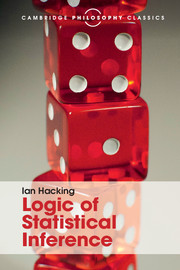Book contents
3 - Support
Published online by Cambridge University Press: 05 July 2016
Summary
Kolmogoroff's axioms, or some equivalent, are essential for a deep investigation of our subject, but do not declare when, on the basis of an experiment, one may infer the exact figure for the frequency in the long run, nor the distribution of chances on trials of some sort. They do not even determine which of a pair of hypotheses about a distribution is better supported by given data. Some other postulates are needed.
In what follows a statistical hypothesis shall be an hypothesis about the distribution of outcomes from trials of kind K on some set-up X. Our problems are various: given some data, which of several statistical hypotheses are best supported? When is a statistical hypothesis established, and when refuted? When is it reasonable to reject an hypothesis? We should also know what to expect from a chance set-up, if a statistical hypothesis is true.
Each question is important, and the correct answers, in so far as they are known, already have a host of applications. But the first question is crucial to the explication of chance. If no one can tell in the light of experimental data which of several hypotheses is best supported, statistical hypotheses are not empirical at all, and chance is no physical property. So our first task is to analyse the support of statistical hypotheses by experimental data.
It is common enough in daily life to say that one hypothesis is better supported than another. A man will claim that his version of quantum theory is better supported than a rival's, or that while there is little support in law for one person's title to his land, there is a good deal to be said for someone else's claim. Since analysis must begin somewhere, I shall not say much about the general notion of support. But I shall give a set of axioms for comparing support for different hypotheses on different data, and, very much later, axioms concerning the measurement of support-by-data. It is to be hoped that the common understanding of the English word ‘support’ plus a set of axioms declaring the principles actually to be used, will suffice as a tool for analysis.
- Type
- Chapter
- Information
- Logic of Statistical Inference , pp. 25 - 34Publisher: Cambridge University PressPrint publication year: 2016

